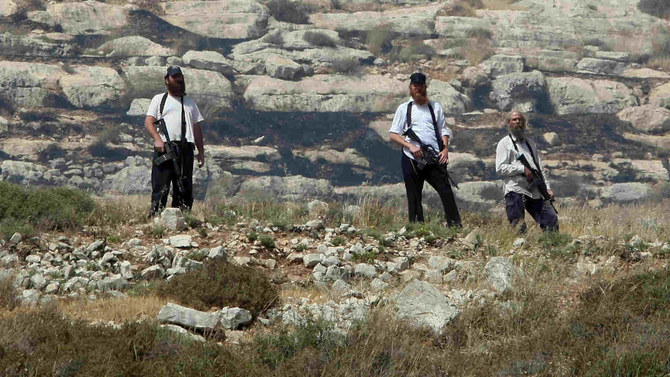
- ARAB NEWS
- 06 Jul 2025

They have been called “subhuman” and “terrorists,” and their actions described as being similar to those of “terror organizations.” Those being called out are the radical Jewish settlers in the occupied West Bank and the labels were slapped on them not by Palestinians, but by key Israeli figures, including former army officers.
Last week, seven Israeli human rights activists were injured during a settler attack near the Palestinian village of Burin. The activists were there to show solidarity with Palestinian farmers whose orchards had previously been damaged by Jewish settlers. According to Israeli press reports, about 15 masked assailants came from the nearby illegal outpost of Giv’at Ronen. They attacked the activists, hurling stones at them and setting one of their cars on fire. They fled the scene before the Israeli army arrived.
Footage of the attack went viral, but this was not an isolated incident. For years, radical settlers have been getting more daring and more provocative in their attacks against hapless Palestinian villagers; uprooting olive trees, burning cars, attacking Palestinian children, setting houses on fire and, most recently, running down innocent pedestrians.
While the international community looked the other way as these attacks became the norm for Palestinian villagers, a growing number of key Israeli figures are now warning of the damage the settlers are doing to the country’s image and the dangers they pose to Israeli society itself. Others have warned that such brazen attacks are making the West Bank “a ticking bomb” that could explode at any minute.
Retired general and former deputy military chief Yair Golan described settlers as “subhuman” because of their attacks on Palestinians. Now a legislator with the Meretz party, he told the Associated Press last week: “You can’t have a free and democratic state so long as we are controlling people who don’t want to be controlled by us.” He had previously prompted a backlash with comments that likened the atmosphere in Israel to that of Nazi-era Germany. His criticism of “fascistic trends in modern-day Israel similar to Nazi Germany” had cost him his job in the military.
Joining him in criticizing the settlers’ attack on human rights activists was Israeli Public Security Minister Omer Bar-Lev, who described the incident as the “actions of a terror organization.” He added: “In this case, it is apparently an organized action, in my view, of a terror group working together.” This was not the first time the minister had attacked the settlers’ actions and he recently said he had received death threats not from Arabs but from Israelis. Bar-Lev was attacked by the Israeli right, with Interior Minister Ayelet Shaked calling him “confused’ after he told a visiting American official he was working on the problem and insisted that violence against Palestinians was a real issue.
Another retired general, former Israel Defense Forces chief of general staff Gadi Eisenkot, this week warned that sympathy and support for Hamas in the West Bank was on the rise and that another round of violence in the occupied areas was likely. “The question is not whether there will be another outbreak, but when and how intense it will be. It is quite clear that this will happen. There’s no way that it’s not going to happen,” he said in an interview with Maariv, adding that it will happen “at the least convenient time and place for us.”
Ignoring all such warnings is right-wing Israeli Prime Minister Naftali Bennett, who last month called settler violence in the West Bank an “insignificant phenomenon.” Bennett and other far-right Israeli politicians have become dependent on the vote of radical Jewish settlers in election cycles. That dependency started with former Prime Minister Benjamin Netanyahu, who ultimately could not compete with the likes of Bennett after he promised the settlers a free hand in the West Bank.
But violence against Palestinians is increasing significantly and so are incidents of kidnapping, the use of live ammunition and the running down of Arabs. According to B’Tselem, an Israeli human rights group, 2021 saw a year-on-year rise in settler violence of 28.6 percent. Yesh Din, which also documents such violence, received reports of 540 settler attacks from 2018 to 2021. Palestinians filed police complaints in 238 of these cases, but only 12 — 5 percent — resulted in indictments, according to Haaretz.
At some point, there will be an outbreak of violence and the crisis will put pressure on Israel internally, across the region and beyond.
Osama Al-Sharif
Most of the attacks come from what Israel calls unauthorized or illegal outposts — settlements that have not been approved — with the settlers carrying out almost daily campaigns to terrorize Palestinian residents; killing their cattle, shooting at their windows and uprooting their olive trees.
Such acts will continue to build up pressure inside the West Bank and it would only take one major incident to ignite the Occupied Territories. Meanwhile, the Israeli government continues to authorize more illegal housing units in defiance of international law.
These terrorist acts by Jewish settlers will continue to divide Israeli society, which is leaning further to the right, with waning support for a peaceful settlement with the Palestinians. At some point, there will be an outbreak of violence and the crisis will put pressure on Israel internally, across the region and beyond. Bennett must be wary of the ticking bomb in the West Bank.